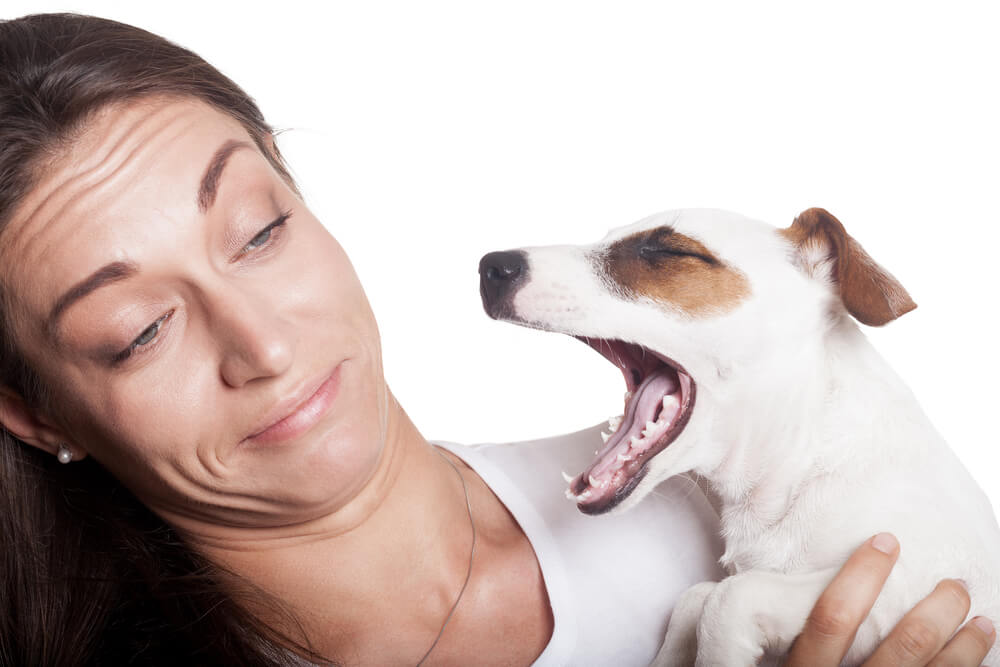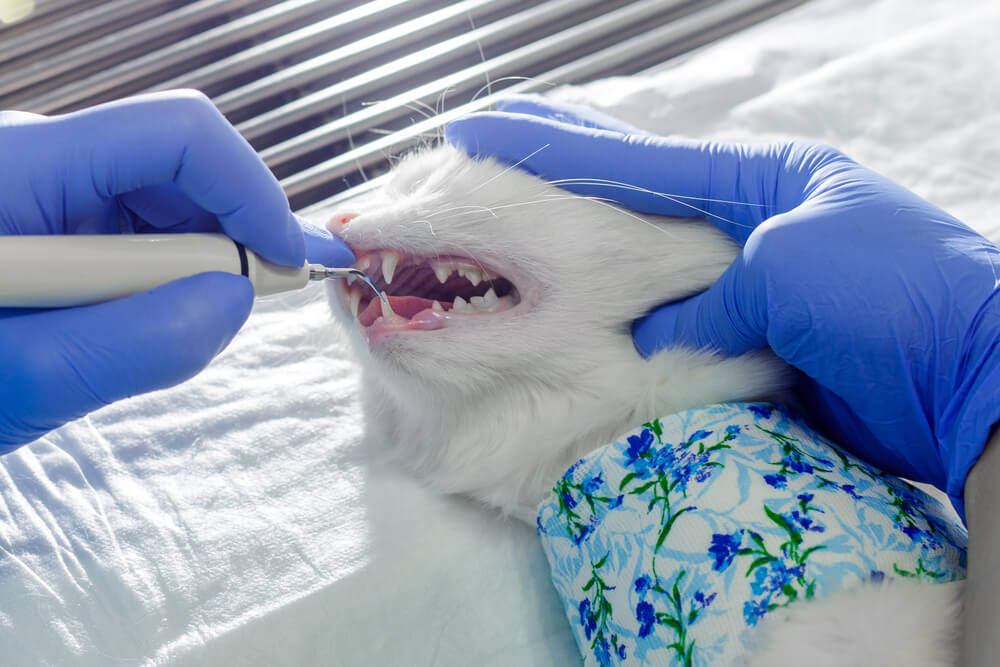
Your pet’s funky breath may indicate a serious medical condition. Our Towne Centre Animal Hospital team wants to ensure you enjoy your pet’s kisses, so we explain potential causes of bad breath in pets and ways to prevent the problem.
Periodontal disease can cause your pet to have bad breath
The most common cause of bad breath in pets is poor dental hygiene and periodontal disease. Your pet’s mouth is colonized by numerous bacteria, which adhere to their teeth to form sticky plaque. If not removed, mineral salts in the saliva precipitate in the plaque, and the deposits harden into tartar. The bacteria produce sulfur compounds that cause your pet’s smelly breath, as well as other, more serious problems, including:
- Bleeding gums — Periodontal bacteria irritate and inflame gingival tissue, leading to swollen and bleeding gums.
- Loose teeth — As bacteria invade under the gum line, the tooth’s supporting structures are damaged, resulting in loose, painful teeth.
- Tooth root abscess — If the bacteria enter the tooth root, an abscess can develop, and the affected tooth will typically need extraction.
- Oronasal fistula — Periodontal bacteria can migrate through the roof of the mouth, creating a passageway between the mouth and nasal cavity. Food material, saliva, and water can enter the nasal passage, causing chronic inflammation and potentially leading to pneumonia.
- Ocular abnormalities — The upper tooth roots are close to the eyes, and periodontal disease involving these teeth can lead to eye infections, and possibly vision loss.
- Jaw fracture — Advanced periodontal disease causes bone deterioration and may lead to jaw fractures. Cats and small-breed dogs are most susceptible to this complication.
- Systemic complications — Periodontal disease increases a pet’s risk of heart, kidney, and liver disease, and can also make blood sugar regulation difficult in diabetic pets.
Other causes of bad breath in pets
Other potential reasons for your pet’s smelly breath may include:
- Foreign body — Many pets love to chew and will target any object they find. If an object gets stuck in their mouth, the foreign material may cause an odor. Small toys can become wedged in the roof of your pet’s mouth, and splinters can lodge under the tongue or in the cheek and be hard to find. In some cases, linear objects, such as string, may get hooked under the tongue.
- Oral tumors — Most common in older pets, oral tumors can become infected and tissue necrosis can occur, leading to a persistent foul odor. The most common oral tumors in pets are melanoma, squamous cell carcinoma, and odontogenic fibromas.
- Kidney disease — The kidneys filter waste products from the body, and when they do not work correctly, toxic urea can build up in the blood, making your pet’s breath smell like ammonia or urine. Other potential signs include lethargy, decreased appetite, oral ulcerations, and weight loss.
- Diabetes — Untreated or unregulated diabetes causes the body to break down fat, which creates molecules called ketones, and can cause sweet or fruity smelling breath. Other potential signs include weight loss and increased thirst and urination.
- Dietary deficiencies — Pets who eat a raw or home-cooked diet may experience dietary deficiencies, causing an imbalance in their normal gut flora that may contribute to bad breath.

Preventing bad breath in pets
To help keep your pet’s breath fresh and nice-smelling, follow these recommendations:
- Schedule regular wellness examinations — Wellness visits help our veterinary team detect conditions, such as kidney and liver disease, and diabetes, in the early stages when they are easier to manage. Adult pets should be evaluated by a veterinary professional once a year, and senior pets, who are more susceptible to disease, should be seen every six months. These visits involve a thorough physical exam, screening blood work and urinalysis, and testing for parasites.
- Schedule regular professional veterinary dental cleanings — Regular professional veterinary dental cleanings are necessary to treat and prevent periodontal disease in pets. These procedures must be performed under general anesthesia to prevent stress and injury, and to allow our team to thoroughly examine and adequately clean your pet’s mouth. Dental X-rays are also needed to detect potential lesions under the gum line. Most pets need a professional veterinary dental cleaning once a year, but high-risk pets, such as small and brachycephalic breeds, may need more frequent evaluations.
- Brush your pet’s teeth daily — Plaque starts to accumulate on your pet’s teeth in about 24 to 48 hours after a cleaning, and daily toothbrushing is important to remove damaging bacteria. Ensure you use pet-friendly products, since human dental products can be dangerous for pets.
- Provide dental treats — Chewing can physically remove plaque from your pet’s teeth. The Veterinary Oral Health Council (VOHC) is a useful resource for safe, effective dental products.
- Feeding a dental diet — Prescription dental diets can help reduce plaque. These diets contain large kibble pieces with a coarse texture that removes plaque as your pet chews, and some have additives to promote a healthy oral environment.
If your pet’s breath is less than pleasant, contact our Towne Centre Animal Hospital team. We can determine what is causing the problem and develop an appropriate plan to remedy the stinky issue.
